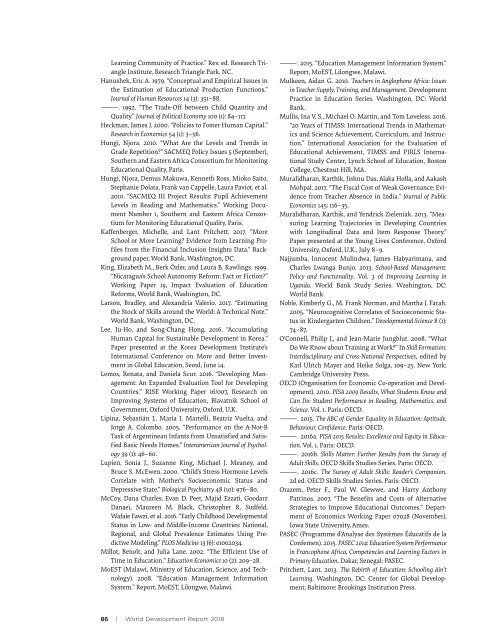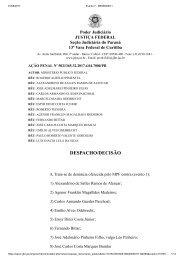Brasil só deve dominar Leitura em 260 anos, aponta estudo do Banco Mundial Relatorio Banco Mundial _Learning
You also want an ePaper? Increase the reach of your titles
YUMPU automatically turns print PDFs into web optimized ePapers that Google loves.
<strong>Learning</strong> Community of Practice.” Rev. ed. Research Triangle<br />
Institute, Research Triangle Park, NC.<br />
Hanushek, Eric A. 1979. “Conceptual and Empirical Issues in<br />
the Estimation of Educational Production Functions.”<br />
Journal of Human Resources 14 (3): 351–88.<br />
————. 1992. “The Trade-Off between Child Quantity and<br />
Quality.” Journal of Political Economy 100 (1): 84–117.<br />
Heckman, James J. 2000. “Policies to Foster Human Capital.”<br />
Research in Economics 54 (1): 3–56.<br />
Hungi, Njora. 2010. “What Are the Levels and Trends in<br />
Grade Repetition?” SACMEQ Policy Issues 5 (Sept<strong>em</strong>ber),<br />
Southern and Eastern Africa Consortium for Monitoring<br />
Educational Quality, Paris.<br />
Hungi, Njora, D<strong>em</strong>us Makuwa, Kenneth Ross, Mioko Saito,<br />
Stephanie Dolata, Frank van Cappelle, Laura Paviot, et al.<br />
2010. “SACMEQ III Project Results: Pupil Achiev<strong>em</strong>ent<br />
Levels in Reading and Math<strong>em</strong>atics.” Working Document<br />
Number 1, Southern and Eastern Africa Consortium<br />
for Monitoring Educational Quality, Paris.<br />
Kaffenberger, Michelle, and Lant Pritchett. 2017. “More<br />
School or More <strong>Learning</strong>? Evidence from <strong>Learning</strong> Profiles<br />
from the Financial Inclusion Insights Data.” Background<br />
paper, World Bank, Washington, DC.<br />
King, Elizabeth M., Berk Özler, and Laura B. Rawlings. 1999.<br />
“Nicaragua’s School Autonomy Reform: Fact or Fiction?”<br />
Working Paper 19, Impact Evaluation of Education<br />
Reforms, World Bank, Washington, DC.<br />
Larson, Bradley, and Alexandria Valerio. 2017. “Estimating<br />
the Stock of Skills around the World: A Technical Note.”<br />
World Bank, Washington, DC.<br />
Lee, Ju-Ho, and Song-Chang Hong. 2016. “Accumulating<br />
Human Capital for Sustainable Development in Korea.”<br />
Paper presented at the Korea Development Institute’s<br />
International Conference on More and Better Investment<br />
in Global Education, Seoul, June 14.<br />
L<strong>em</strong>os, Renata, and Daniela Scur. 2016. “Developing Manag<strong>em</strong>ent:<br />
An Expanded Evaluation Tool for Developing<br />
Countries.” RISE Working Paper 16/007, Research on<br />
Improving Syst<strong>em</strong>s of Education, Blavatnik School of<br />
Government, Oxford University, Oxford, U.K.<br />
Lipina, Sebastián J., María I. Martelli, Beatriz Vuelta, and<br />
Jorge A. Colombo. 2005. “Performance on the A-Not-B<br />
Task of Argentinean Infants from Unsatisfied and Satisfied<br />
Basic Needs Homes.” Interamerican Journal of Psychology<br />
39 (1): 46–60.<br />
Lupien, Sonia J., Suzanne King, Michael J. Meaney, and<br />
Bruce S. McEwen. 2000. “Child’s Stress Hormone Levels<br />
Correlate with Mother’s Socioeconomic Status and<br />
Depressive State.” Biological Psychiatry 48 (10): 976–80.<br />
McCoy, Dana Charles, Evan D. Peet, Majid Ezzati, Goodarz<br />
Danaei, Maureen M. Black, Christopher R. Sudfeld,<br />
Wafaie Fawzi, et al. 2016. “Early Childhood Developmental<br />
Status in Low- and Middle-Income Countries: National,<br />
Regional, and Global Prevalence Estimates Using Predictive<br />
Modeling.” PLOS Medicine 13 (6): e1002034.<br />
Millot, Benoît, and Julia Lane. 2002. “The Efficient Use of<br />
Time in Education.” Education Economics 10 (2): 209–28.<br />
MoEST (Malawi, Ministry of Education, Science, and Technology).<br />
2008. “Education Manag<strong>em</strong>ent Information<br />
Syst<strong>em</strong>.” Report, MoEST, Lilongwe, Malawi.<br />
————. 2015. “Education Manag<strong>em</strong>ent Information Syst<strong>em</strong>.”<br />
Report, MoEST, Lilongwe, Malawi.<br />
Mulkeen, Aidan G. 2010. Teachers in Anglophone Africa: Issues<br />
in Teacher Supply, Training, and Manag<strong>em</strong>ent. Development<br />
Practice in Education Series. Washington, DC: World<br />
Bank.<br />
Mullis, Ina V. S., Michael O. Martin, and Tom Loveless. 2016.<br />
“20 Years of TIMSS: International Trends in Math<strong>em</strong>atics<br />
and Science Achiev<strong>em</strong>ent, Curriculum, and Instruction.”<br />
International Association for the Evaluation of<br />
Educational Achiev<strong>em</strong>ent, TIMSS and PIRLS International<br />
Study Center, Lynch School of Education, Boston<br />
College, Chestnut Hill, MA.<br />
Muralidharan, Karthik, Jishnu Das, Alaka Holla, and Aakash<br />
Mohpal. 2017. “The Fiscal Cost of Weak Governance: Evidence<br />
from Teacher Absence in India.” Journal of Public<br />
Economics 145: 116–35.<br />
Muralidharan, Karthik, and Yendrick Zieleniak. 2013. “Measuring<br />
<strong>Learning</strong> Trajectories in Developing Countries<br />
with Longitudinal Data and It<strong>em</strong> Response Theory.”<br />
Paper presented at the Young Lives Conference, Oxford<br />
University, Oxford, U.K., July 8–9.<br />
Najjumba, Innocent Mulindwa, James Habyarimana, and<br />
Charles Lwanga Bunjo. 2013. School-Based Manag<strong>em</strong>ent:<br />
Policy and Functionality. Vol. 3 of Improving <strong>Learning</strong> in<br />
Uganda. World Bank Study Series. Washington, DC:<br />
World Bank.<br />
Noble, Kimberly G., M. Frank Norman, and Martha J. Farah.<br />
2005. “Neurocognitive Correlates of Socioeconomic Status<br />
in Kindergarten Children.” Developmental Science 8 (1):<br />
74–87.<br />
O’Connell, Philip J., and Jean-Marie Jungblut. 2008. “What<br />
Do We Know about Training at Work?” In Skill Formation:<br />
Interdisciplinary and Cross-National Perspectives, edited by<br />
Karl Ulrich Mayer and Heike Solga, 109–25. New York:<br />
Cambridge University Press.<br />
OECD (Organisation for Economic Co-operation and Development).<br />
2010. PISA 2009 Results, What Students Know and<br />
Can Do: Student Performance in Reading, Math<strong>em</strong>atics, and<br />
Science. Vol. 1. Paris: OECD.<br />
————. 2015. The ABC of Gender Equality in Education: Aptitude,<br />
Behaviour, Confidence. Paris: OECD.<br />
————. 2016a. PISA 2015 Results: Excellence and Equity in Education.<br />
Vol. 1. Paris: OECD.<br />
————. 2016b. Skills Matter: Further Results from the Survey of<br />
Adult Skills. OECD Skills Studies Series. Paris: OECD.<br />
————. 2016c. The Survey of Adult Skills: Reader’s Companion.<br />
2d ed. OECD Skills Studies Series. Paris: OECD.<br />
Oraz<strong>em</strong>, Peter F., Paul W. Glewwe, and Harry Anthony<br />
Patrinos. 2007. “The Benefits and Costs of Alternative<br />
Strategies to Improve Educational Outcomes.” Department<br />
of Economics Working Paper 07028 (Nov<strong>em</strong>ber),<br />
Iowa State University, Ames.<br />
PASEC (Programme d’Analyse des Systèmes Éducatifs de la<br />
Conf<strong>em</strong>en). 2015. PASEC 2014: Education Syst<strong>em</strong> Performance<br />
in Francophone Africa, Competencies and <strong>Learning</strong> Factors in<br />
Primary Education. Dakar, Senegal: PASEC.<br />
Pritchett, Lant. 2013. The Rebirth of Education: Schooling Ain’t<br />
<strong>Learning</strong>. Washington, DC: Center for Global Development;<br />
Baltimore: Brookings Institution Press.<br />
86 | World Development Report 2018








